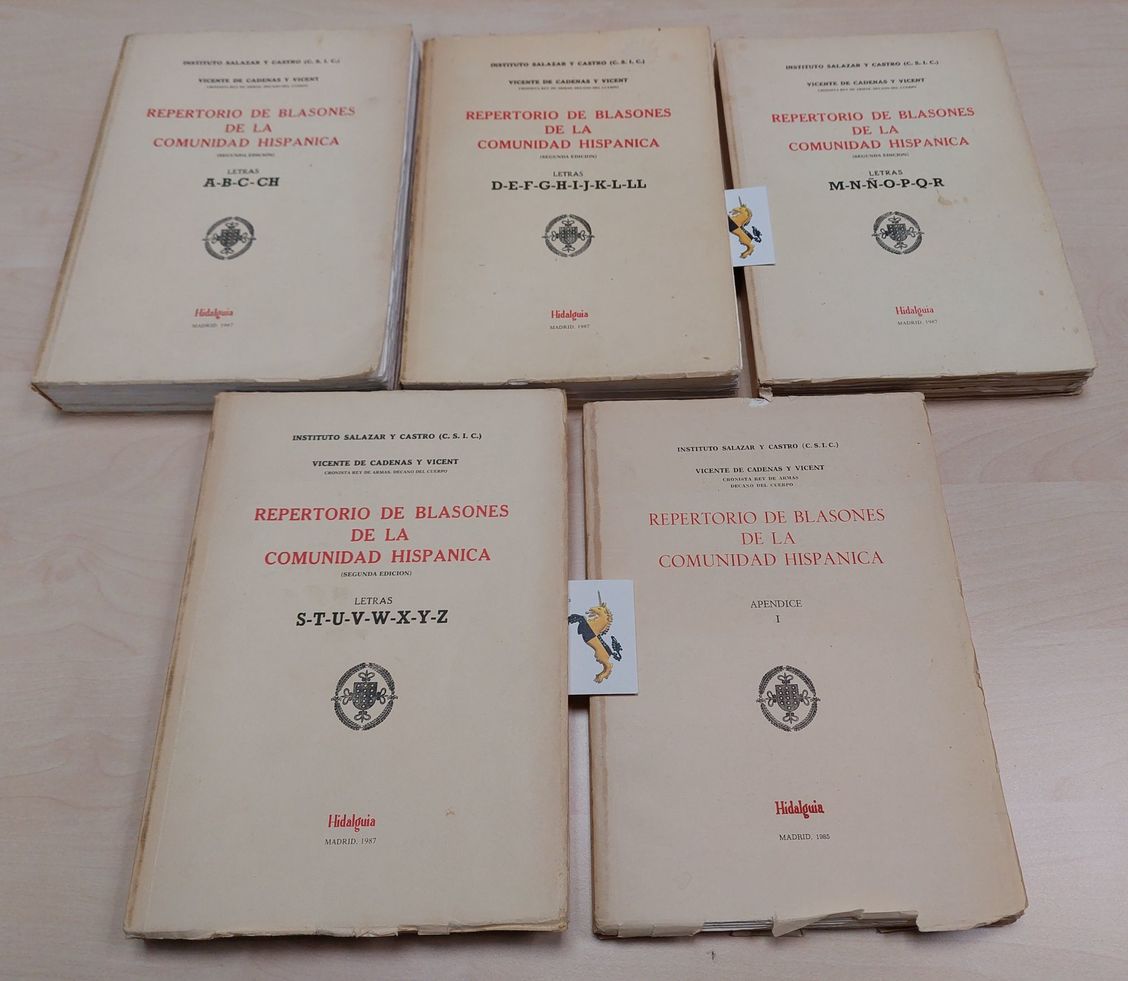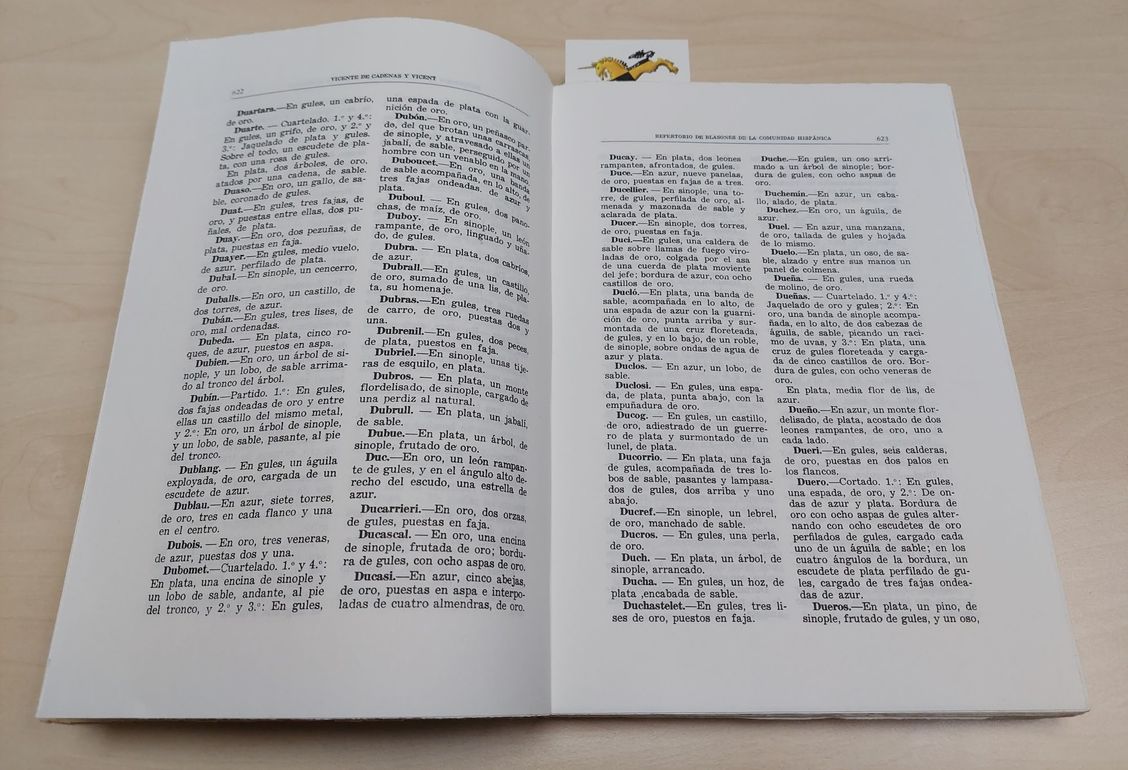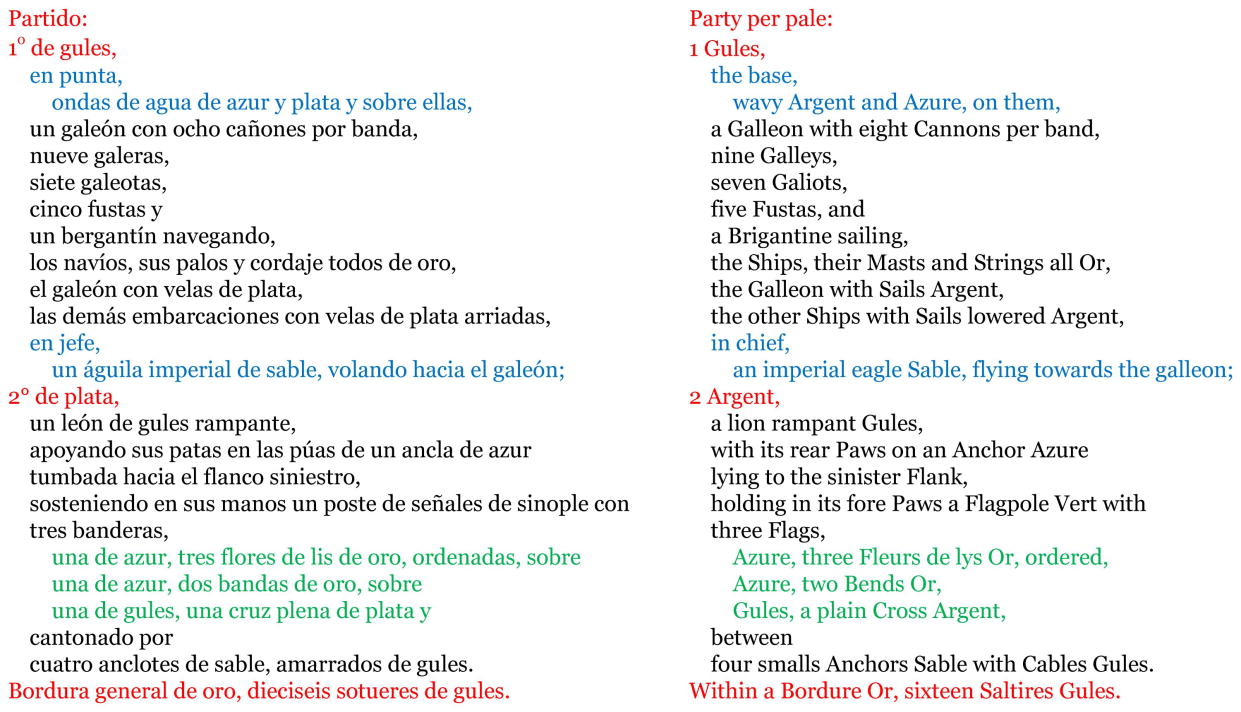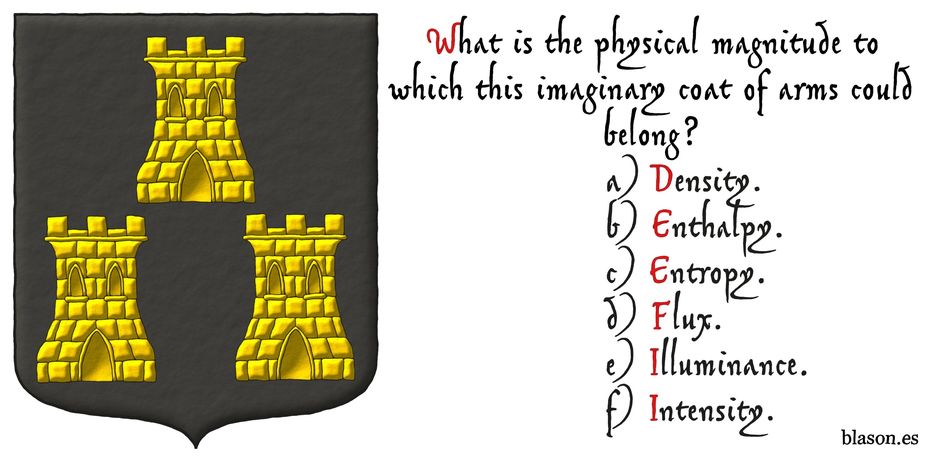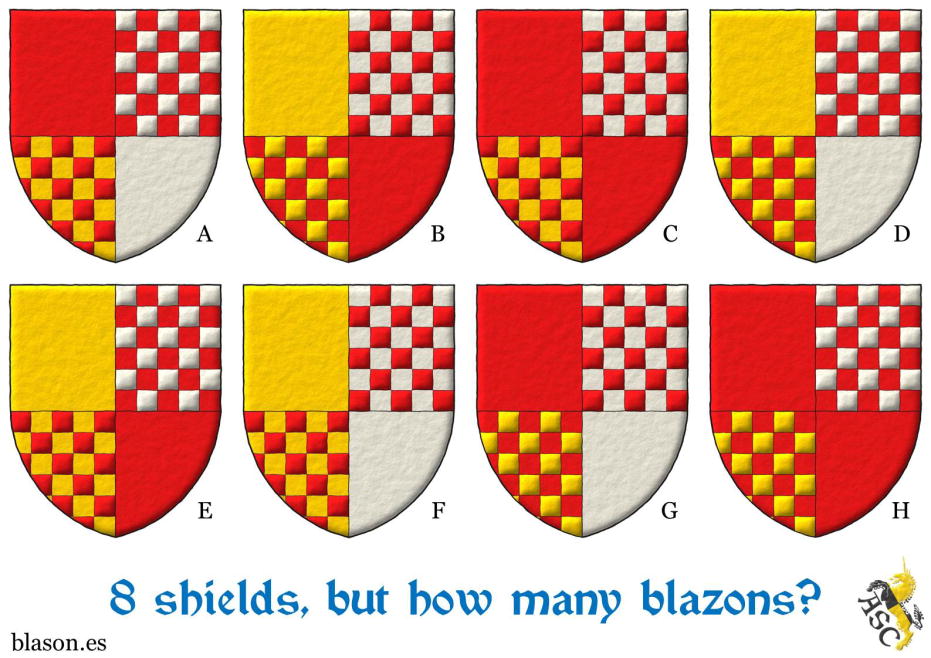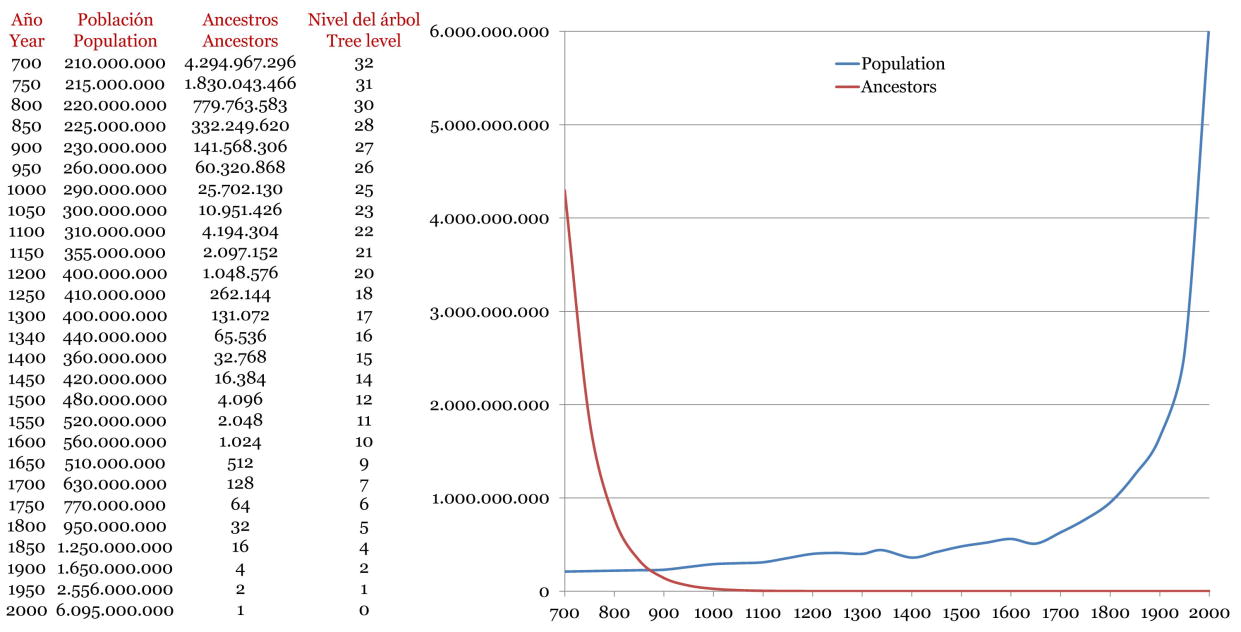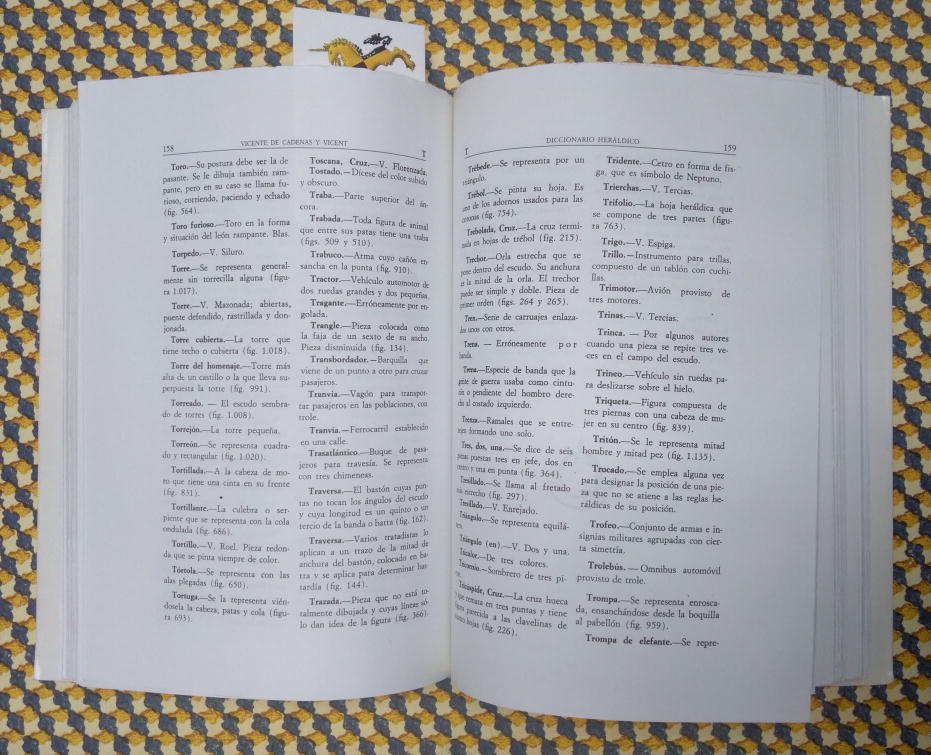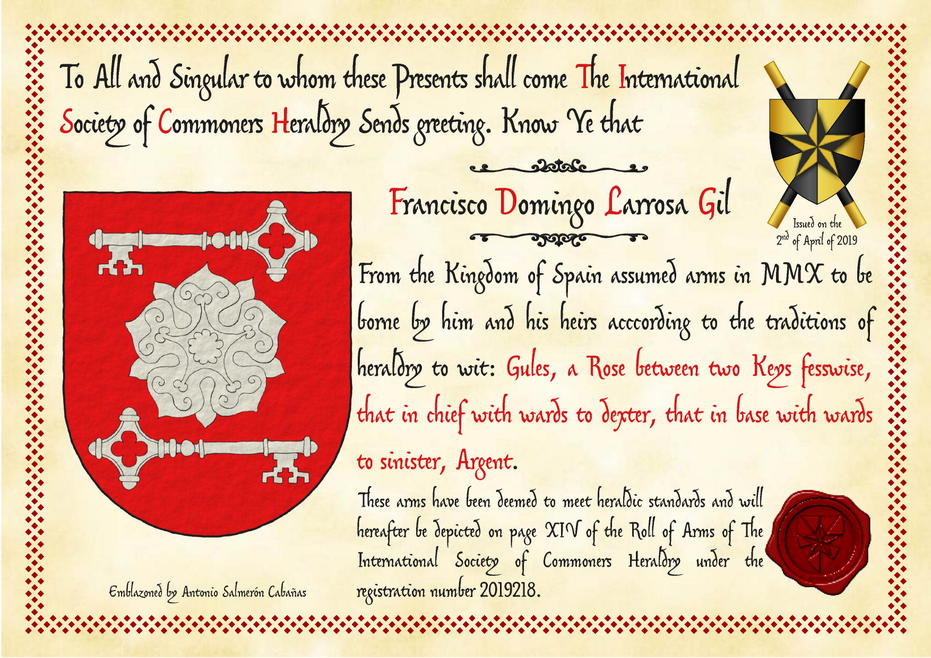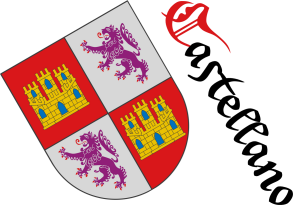
![Ver [Cadenas y Vicent, V. de; 1987] en referencias bibliográficas. Libro abierto, hojas de plata, filo de oro, guardas de gules, tapas de sable.](../css/Libro.Bibliografia.png)
Cadenas y Vicent, V. de; 1987
Vicente de Cadenas y Vicent, Dean King of Arms, «Repertorio de blasones de la comunidad hispánica», Instituto Salazar Castro (C. S. I. C. Higher Center for Scientific Research), edited by Ediciones Hidalguía, printed by Gráficas Arias Montano, S. A., Móstoles, 2nd edition, ISBN of the complete work 84-00-06642-1, Legal deposit of the complete work M.31.950-1987, Madrid, 1987.
4 volumes and 1 apendix
- Volume I, contains the surnames that begin with the letters A, B, C & CH, and ISBN of this volume I 84-00-06643-X.
- Volume II, contains the surnames that begin with the letters D, E, F, G, H, I, J, K, L & LL, and ISBN of this volume II 84-00-06044-8.
- Volume III, contains the surnames that begin with the letters M, N, Ñ, O, P, Q & R, and ISBN of this volume III 84-00-06645-6.
- Volume IV, contains the surnames that begin with the letters S, T, U, V, W, X, Y & Z, and ISBN of this volume IV 84-00-06646-4.
- Apendix I, contains other surnames not included in the previous volumes, and ISBN of this apendix I I 84-00-05912-3.
Example, Uranzu in the volume VI
Volume IV has 454 pages numbered from 1,525 to 1,979. The author states on page 1,526 that in this volume IV, more than in the others, he wished to respect the original wording of the blazons used in his sources and that this volume contains a large number of coats of arms of «Basque and Navarrese surnames», many of which begin with the letter U.
Among those beginning with the letter U, I would like to present the example of «Uranzu», for which Vicente de Cadenas describes five blazons on pages 1,726 and 1,728. The fourth blazoned coat of arms is as follows; note that I have attempted to simplify the wording (the five original blazons can be seen in the previous figure):
Party per pale:
1 Gules,
the base,
wavy Argent and Azure, on them,
a Galleon with eight Cannons per band,
nine Galleys,
seven Galiots,
five Fustas, and
a Brigantine sailing,
the Ships, their Masts and Strings all Or,
the Galleon with Sails Argent,
the other Ships with Sails lowered Argent,
in chief,
an imperial eagle Sable, flying towards the galleon;
2 Argent,
a lion rampant Gules,
with its rear Paws on an Anchor Azure
lying to the sinister Flank,
holding in its fore Paws a Flagpole Vert with
three Flags,
Azure, three Fleurs de lis Or, ordered,
Azure, two Bends Or,
Gules, a plain Cross Argent,
between
four smalls Anchors Sable with Cables Gules.
Within a Bordure Or, sixteen Saltires Gules.
Although I am not sure of the reality of this coat of arms, I have made a) in Spanish a simplification and b) its translation in parallel to English. I assume that in the 2nd flag the Fleurs de lis in triangle are 3 and they are ordered. Although I am not sure of the reality of this busy coat of arms, I can't found a painted version, I have made a) a simplification of its Spanish blazon and b) its translation in parallel to English. I assume that in the 2nd flag the Fleurs de lis in triangle are 3 and they are ordered. The colors of the text in the images lets an easy reading and show the blazon structure. There are in this coat of arms 1+9+7+5+1 = 23 ships.
Currently the National Institute of Statistics of Spain (I. N. E.), about the surname «Uranzu» answer that «there are no inhabitants with the surname consulted», neither 1st nor 2nd surname, «or its frequency is less than 5 for the national total».
Bibliographical reference of century XX.
Classification: De bibliotheca and In black and white.
Author: Cadenas y Vicent, Vicente de.
The following articles cite this bibliographic reference:
- Albero, lineage of Aragon
- Argüello of Extremadura, lineage
- Burr, lineage
- Christopher, N.; 2025
- Egado, lineage
- Gangoiti, lineage
- Laydin, lineage
- Lozengy 5x6 and 6x7
- Osona, lineage
- Pile issuant from the base in the Dictionary of the Spanish Language
- Poumola, lineage of Catalonia
External links:
Internal resources: Physical book on paper.


Sable, three Towers Or, two and one
Sable, three Towers Or, two and one
The classic heraldic layout for three charges on a coat of arms is two in chief and on in base. The layout one in chief and two at base are considered disordered in many heraldic traditions.
The blazon of this coat of arms, «Sable, three Towers Or, two and one», is disordered, and the entropy refers to disorder, and more entropy means more disorder. Then this imaginary coat of arms is full of entropy, and it could belong to the entropy.
Categories: Riddle solution, Imaginary, Sable, Three, Tower, Or, Two, One and Disordered.


8 shields, but how many blazons?
In the following image there are painted 8 shields, but how many different blazons are there? First, think your answer, then write the different blazons and, finally, check if your initial answer was correct.
Write the coats of arms and check your answer
Think before you move the cursor or click on the following link and see the solution.
Categories: Riddle, Gules, Or, Argent, Quarterly and Chequey.


Pedigree collapse, we are all cousins
We have 2 parents, 4 grandparents, 8 great grandparents, 16 great grandparents,... growing exponentially (2n), 32, 64, 128, ... Circa the year 850 we have more «theoretical» ancestors than inhabitants of the world. It follows that:
- Many of our ancestors are repeated in our family tree.
- Many historical figures (philosophers, scientists, writers, artists, kings, warriors, etc.) will appear in our family tree.
- We share many ancestors with others, we are all cousins, we are a great family.
I have painted the following graphic to show this idea. Traveling to the past we see the number of our «theoretical» ancestors grows and the world's population decreases.
The graph is calculated with 2.46 generations per century, and with other rates although the graph changes but the previous conclusions remain. For example, with 4 generations per century, more real rate time ago when we had children at an earlier age, the curves intersect before. If it is done by continents and/or adding the lines without offspring, the high infant mortality and pests of past times,... the curves also cross before.
To this effect is called «pedigree collapse».
Category: Genealogy.


![Ver [Cadenas y Vicent, V. de; 2002] en referencias bibliográficas. Libro abierto, hojas de plata, filo de oro, guardas de gules, tapas de sable.](../css/Libro.Bibliografia.png)
Cadenas y Vicent, V. de; 2002
Vicente de Cadenas y Vicent, Dean King of Arms, «Diccionario heráldico: Términos, Piezas y Figuras Usadas en la Ciencia del Blasón», Instituto Salazar Castro (C. S. I. C. Higher Center for Scientific Research), edited by Ediciones Hidalguía, 6th edition with more heraldic terms, 338 pages, Madrid, 2002.
In 1953, the 1st edition was awarded the Menestrier Prize, from the International Institute of Genealogy and Heraldry.
Bibliographical reference of century XXI.
Classification: De bibliotheca and In black and white.
The author is Cadenas y Vicent, Vicente de.
Bibliographic reference mentioned in the following articles:
- Lopez Linares, Barbaro Jonathan
- Pile issuant from the base in the Dictionary of the Spanish Language
- Vilardi, lineage of Italy
External link:
Internal resources: Physical book on paper.


Francisco Domingo Larrosa Gil, plain tincture
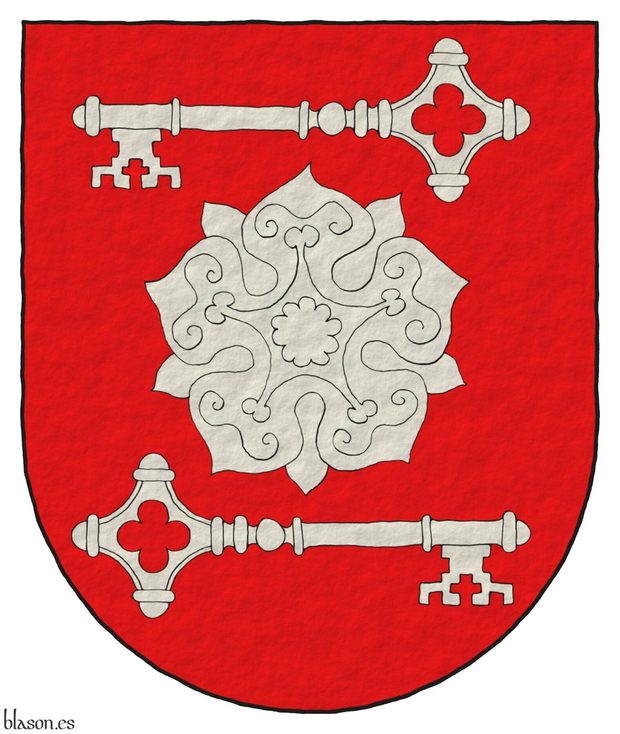
Gules, a rose between in chief a key wards to dexter facing downwards, in base a key wards to sinister facing downwards Argent.
Coat of arms emblazoned by me, in flat tinctures, outlined in Sable, with a semi-circular external shape and with a texturized finish.
The coat of arms for Francisco Domingo Larrosa Gil emblazoned by me.
Blazon keywords: Gules, Argent, One, Rose, Between, In chief, Key, Dexter, Point upwards, In base, Point downwards and Sinister.
Style keywords: Outlined in sable, Plain tincture and Semi-circular.
Classification: Personal, Interpreted, Boa and Coat of arms.
Bearer: Larrosa Gil, Francisco Domingo.


Larrosa Gil, Francisco Domingo
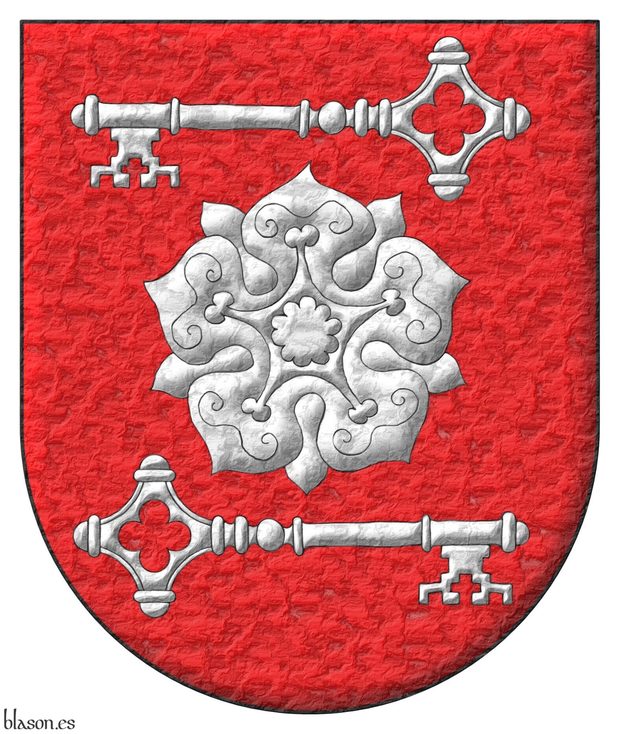
Gules, a rose between in chief a key wards to dexter facing downwards, in base a key wards to sinister facing downwards Argent.
Escudo de gules, una rosa acompañada en jefe de una llave con el dentado hacia la diestra y abajo, en punta de una llave con el dentado hacia la siniestra y abajo, todo de plata.
Coat of arms depicted by me, illuminated with lights and shadows, outlined in Sable, with a semi-circular outer contour and with a metal beaten finish.
Blazon keywords: Gules, Argent, One, Rose, Between, In chief, Key, Dexter, Point upwards, In base, Point downwards and Sinister.
Style keywords: Outlined in sable, Illuminated, Semi-circular and Metal beaten.
Classification: Personal, Interpreted, Boa and Coat of arms.
Bearer: Larrosa Gil, Francisco Domingo.


Commoners' certification Francisco Domingo Larrosa Gil
Gules, a rose between in chief a key wards to dexter facing downwards, in base a key wards to sinister facing downwards Argent
The Commoners' Certification of Arms for Francisco Domingo Larrosa Gil with his coat of arms emblazoned by me. Alternative blazon used in the certification: Gules, a rose between two keys fesswise Argent, that in chief with wards to dexter, that in base with wards to sinister.
Blazon keywords: Gules, Argent, One, Rose, Between, In chief, Key, Dexter, Point upwards, In base, Point downwards and Sinister.
Style keywords: Outlined in sable, Illuminated and Semi-circular.
Classification: Personal, Interpreted, Boa, Certification and Heraldic document.
Bearer: Larrosa Gil, Francisco Domingo.

Continue with: Moreno de Vargas, B.; 1795.
-
Language
-
Categories of heraldry
-
Divisions of the field
- Without divisions
- Party per pale
- Party per fess
- Party per bend
- Party per bend sinister
- Tierce
- Tierce sinister
- Tierced per pale
- Tierced per fess
- Tierced per bend
- Tierced pallwise inverted
- Quarterly
- Quarterly per saltire
- Gyronny
- Party per fess, the chief per pale
- Party per pale, the sinister per fess
- Party per fess, the base per pale
- Party per pale, the dexter per fess
- Chapé
- Chaussé
- Embrassé
- Contre-embrassé
- Party per chevron
- Enté
- Enté en point
- Flanched
-
Metals
-
Colours
-
Furs
-
Other tinctures
-
Ordinaries and sub-ordinaries
-
Diminutives of the ordinaries
-
Geometric charges
-
Composite ordinaries
-
Inanimate charges from Nature
Atom, Crescent, Diamond, Emerald, Estoile, Increscent, Lightning flash, Moon, Mount, Mullet, Mullet of four points, Orbital, Plough of Ursa Major, Rainbow, Ray of the sun, River, Sea, Snowflake, Sun, Sun in splendour, Sun of May, Trimount, Water and Wave.
-
Vegetal charges from Nature
Acorn, Apple, Apple tree, Ash, Bluebonnet, Camellia, Chrysanthemum, Cinquefoil, Cornflower, Dogwood flower, Double rose, Eguzki-lore, Elm, Fleur de lis, Flower, Gourd, Holm oak, Hop cone, Indian paintbrush, Kapok tree, Laurel, Lily, Linden, Lotus flower, Madonna lily, Mexican cedar tree, Oak, Olive tree, Palm tree, Plantain plant, Pomegranate, Poplar leaf, Rose, Shamrock, Sunflower, Thistle, Tree, Tulip, Vine and Wheat.
-
Animal charges from Nature
Badger, Bald eagle, Barbel, Barn owl, Bear, Beaver, Bee, Beetle, Bighorn sheep, Binson, Blackbird, Boar, Brach hound, Bull, Cow, Doe, Dog, Dolphin, Dove, Eagle, Elephant, Falcon, Female figure, Fish, Flame, Fly, Fox, Frog, Goat, Goldfinch, Goose, Heron, Horse, Hummingbird, Jaguar, Lark, Leopard, Lion, Lion passant, Lion rampant guardant, Lioness, Lynx, Male figure, Martlet, Merino ram, Owl, Panther, Parrot, Peacock, Pelican, Pelican in her piety, Pronghorn, Puffin, Quetzal, Raven, Roe deer, Rooster, Savage, Seagull, Serpent, She-wolf, Stag, Starling, Talbot, Turtle, Tyger, Vulture, Warren hound and Wolf.
-
Parts of natural charges
Arm, Beak, Branch, Caboshed, Chest, Claw, Covert, Dorsal fin, Eagle claw, Ear of wheat, Ermine spot, Escallop, Feather, Foot (palmiped), Foreleg, Forepaw, Hand, Head, Heart, Hoof, Leaf, Neck, Ostrich feather, Palm frond, Paw, Roe deers' attires, Shoulder, Sprig, Stags' attires, Stem, Swallow-tail, Tail, Tail addorsed, Tail fin, Talon, Tibia, Tooth, Trunk, Trunk (elephant), Two hands clasped, Two wings in vol, Udder, Wing and Wrist.
-
Artificial charges
Ace of spades, Anchor, Anvil, Arch, Arm vambraced, Armillary sphere, Arrow, Axe, Bell, Bell tower, Beret, Bonfire, Book, Bookmark, Bow, Branding iron, Bridge, Broken, Buckle, Cannon, Cannon dismounted, Cannon port, Canopy roof, Carbuncle, Castle, Celtic Trinity knot, Chain, Chess rooks, Church, Clarion, Clay pot, Closed book, Club, Column, Comb, Compass rose, Conductor's baton, Cord, Covered cup, Crozier, Crucible, Cuffed, Cup, Cyclamor, Dagger, Displayed scroll, Double vajra, Drum, Ecclesiastical cap, Fanon, Federschwert, Fleam, Four crescents joined millsailwise, Galician granary, Garb, Gauntlet, Geometric solid, Grenade, Halberd, Hammer, Harp, Host, Hourglass, Key, Key ward, Knight, Knot, Lantern, Letter, Line, Loincloth, Maunch, Menorah, Millrind, Millstone, Millwheel, Monstrance, Mortar, Mullet of six points pierced, Nail, Non-classic artifact, Norman ship, Number, Oar, Oil lamp, Open book, Page, Pair of pliers, Pair of scales, Parchment, Pestle, Piano, Pilgrim's staff, Plough share, Polish winged hussar, Port, Portcullis, Potent, Quill, Ribbon, Rosette of acanthus leaves, Sabre, Sackbut, Sail, Scroll, Scythe, Sheaf of tobacco, Ship, Skirt, Spear, Spear's head, Stairway, Star of David, Step, Sword, Symbol, Tetrahedron, Torch, Tower, Trident, Trumpet, Turret, Two-handed sword, Wagon-wheel, Water-bouget, Wheel, Winnowing fan and With a turret.
-
Immaterial charges
Angel, Archangel, Basilisk, Dragon, Dragon's head, Garuda, Golden fleece, Griffin, Heart enflamed, Justice, Mermaid, Our Lady of Mercy, Ouroboros, Paschal lamb, Pegasus, Phoenix, Sacred Heart of Jesus, Saint George, Sea-griffin, Sea-lion, Trinity, Triton, Unicorn, Winged hand and Wyvern.
-
External elements
-
Heraldic creations
-
References
-
Formats
-
Keywords on this page
Riddle, Between, Chequey, Point upwards, Point downwards, Bibliography, Boa, Certification, Quarterly, De bibliotheca, Outlined in sable, Disordered, Dexter, Heraldic document, Two, In black and white, In chief, In base, Coat of arms, Genealogy, Personal, Gules, Illuminated, Imaginary, Interpreted, Larrosa Gil, Francisco Domingo, Castilian language, Key, Semi-circular, Metal beaten, Or, Argent, Rose, Sable, Century XVIII, Century XX, Century XXI, Sinister, Riddle solution, Plain tincture, Tower, Three and One.

